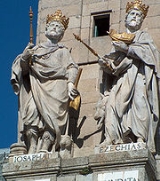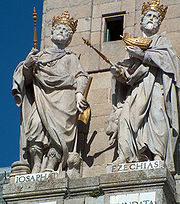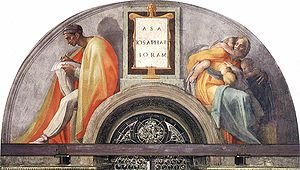
Jehoshaphat
Encyclopedia

Kingdom of Judah
The Kingdom of Judah was a Jewish state established in the Southern Levant during the Iron Age. It is often referred to as the "Southern Kingdom" to distinguish it from the northern Kingdom of Israel....
, and successor of his father Asa
Asa of Judah
Asa was the third king of the Kingdom of Judah and the fifth king of the House of David. He was the son of Abijam, grandson of Rehoboam, and great-grandson of Solomon. The Hebrew Bible gives the period of his reign as 41 years. His reign is dated between 913-910 BCE to 873-869 BCE. He was...
. His children included Jehoram
Jehoram of Judah
Jehoram of Judah was the king of the southern Kingdom of Judah, and the son of Jehoshaphat .According to , Jehoram became king of Judah in the fifth year of Jehoram of Israel, when his father Jehoshaphat was king of Judah, indicating a co-regency. The author of Kings also speaks of both Jehoram...
, who succeeded him as king. His mother was Azubah
Azubah (mother of Jehoshaphat)
Azubah is a Biblical name meaning "desolation".Azubah was the wife of King Asa and the mother of King Jehoshaphat of Israel. She was the daughter of Shilhi....
Historically, his name has sometimes been connected with the Valley of Jehosaphat, where, according to Joel
Book of Joel
The Book of Joel is part of the Hebrew Bible. Joel is part of a group of twelve prophetic books known as the Minor Prophets or simply as The Twelve; the distinction 'minor' indicates the short length of the text in relation to the larger prophetic texts known as the "Major Prophets".-Content:After...
3:2, the God of Israel will gather all nations for judgment.
Reign
Jehoshaphat took the throne at the age of thirty-five and reigned for twenty-five years. William F. AlbrightWilliam F. Albright
William Foxwell Albright was an American archaeologist, biblical scholar, philologist and expert on ceramics. From the early twentieth century until his death, he was the dean of biblical archaeologists and the universally acknowledged founder of the Biblical archaeology movement...
has dated the reign of Jehoshaphat to 873 – 849 BC. E. R. Thiele
Edwin R. Thiele
Edwin R. Thiele was an American missionary in China, an editor, archaeologist, writer, and Old Testament professor. He is best known for his chronological studies of the Hebrew kingdom period.- Biography :...
held that he became coregent with his father Asa
Asa of Judah
Asa was the third king of the Kingdom of Judah and the fifth king of the House of David. He was the son of Abijam, grandson of Rehoboam, and great-grandson of Solomon. The Hebrew Bible gives the period of his reign as 41 years. His reign is dated between 913-910 BCE to 873-869 BCE. He was...
in Asa's thirty-ninth year, 872/871 BC, the year Asa was afflicted with a severe disease in his feet, and then became sole regent when Asa died of the disease in 870/869 BC, his own death occurring in 848/847 BC. Thiele's chronology for the first kings of Judah contained an internal inconsistency that later scholars corrected by dating these kings one year earlier, so that Jehoshaphat's dates are taken as one year earlier in the present article: coregency beginning in 873/871, sole reign commencing in 871/870, and death in 849/848 BC.
Jehoshaphat spent the first years of his reign fortifying his kingdom against Israel . The Bible lauds the king for overcoming sexual corruption , and for destroying the cult image
Cult image
In the practice of religion, a cult image is a human-made object that is venerated for the deity, spirit or daemon that it embodies or represents...
s or "idols" of Baal
Baal
Baʿal is a Northwest Semitic title and honorific meaning "master" or "lord" that is used for various gods who were patrons of cities in the Levant and Asia Minor, cognate to Akkadian Bēlu...
in the land. In the third year of his reign Jehoshaphat sent out priests and Levite
Levite
In Jewish tradition, a Levite is a member of the Hebrew tribe of Levi. When Joshua led the Israelites into the land of Canaan, the Levites were the only Israelite tribe that received cities but were not allowed to be landowners "because the Lord the God of Israel himself is their inheritance"...
s over the land to instruct the people in the Law
Torah
Torah- A scroll containing the first five books of the BibleThe Torah , is name given by Jews to the first five books of the bible—Genesis , Exodus , Leviticus , Numbers and Deuteronomy Torah- A scroll containing the first five books of the BibleThe Torah , is name given by Jews to the first five...
, an activity that was commanded for a Sabbatical year in Deuteronomy 31:10-13. The author of 2 Chronicles generally praises his reign, stating that the kingdom enjoyed a great measure of peace and prosperity, the blessing of God resting on the people "in their basket and their store."
Alliances

Ahab
Ahab or Ach'av or Achab in Douay-Rheims was king of Israel and the son and successor of Omri according to the Hebrew Bible. His wife was Jezebel....
, which was based on marriage: Jehoshaphat married his son Jehoram
Jehoram of Judah
Jehoram of Judah was the king of the southern Kingdom of Judah, and the son of Jehoshaphat .According to , Jehoram became king of Judah in the fifth year of Jehoram of Israel, when his father Jehoshaphat was king of Judah, indicating a co-regency. The author of Kings also speaks of both Jehoram...
to Athaliah
Athaliah
Athaliah was the queen of Judah during the reign of King Jehoram, and later became sole ruler of Judah for six years. William F. Albright has dated her reign to 842–837 BC, while Edwin R. Thiele's dates, as taken from the third edition of his magnum opus, were 842/841 to 836/835 BC...
, daughter of Ahab . This alliance led to much disgrace, and brought disaster on his kingdom with the Battle of Ramoth-Gilead. While Jehoshaphat safely returned from this battle, he was confronted by the prophet Jehu
Jehu (prophet)
Jehu , ) son of Hanani was a prophet in the Hebrew Bible, who was active in the 9th century BC.According to the Bible, Jehu condemned the house of Baasha, king of Israel, accusing him of leading the people into sin like his predecessor Jeroboam...
, son of Hanani
Hanani
The word Hanani means "God has gratified me", or "God is gracious".Hanani is the name of three men in the Hebrew Bible* One of the sons of Heman ....
, about this alliance. We are told that Jehoshaphat repented, and returned to his former course of opposition to all idolatry
Idolatry
Idolatry is a pejorative term for the worship of an idol, a physical object such as a cult image, as a god, or practices believed to verge on worship, such as giving undue honour and regard to created forms other than God. In all the Abrahamic religions idolatry is strongly forbidden, although...
, and promoting the worship of God and in the government of his people .
Again he entered into an alliance with Ahaziah
Ahaziah of Israel
Ahaziah or Ochozias was king of Israel and the son of Ahab and Jezebel.William F. Albright has dated his reign to 850-849 BC, while E. R. Thiele offers the dates 853-852 BC...
, the king of Israel, for the purpose of carrying on maritime commerce with Ophir
Ophir
Ophir is a port or region mentioned in the Bible, famous for its wealth. King Solomon is supposed to have received a cargo of gold, silver, sandalwood, precious stones, ivory, apes and peacocks from Ophir, every three years.- Citations :...
. But the fleet that was then equipped at Ezion-Gever was immediately wrecked. A new fleet was fitted out without the cooperation of the king of Israel, and although it was successful, the trade was not prosecuted .
He subsequently joined Jehoram
Jehoram of Israel
Jehoram was a king of the northern Kingdom of Israel. He was the son of Ahab and Jezebel.According to , in the fifth year of Joram of Israel, Jehoram became king of Judah, when his father Jehoshaphat was king of Judah, indicating a co-regency...
, king of Israel, in a war against the Moab
Moab
Moab is the historical name for a mountainous strip of land in Jordan. The land lies alongside much of the eastern shore of the Dead Sea. The existence of the Kingdom of Moab is attested to by numerous archeological findings, most notably the Mesha Stele, which describes the Moabite victory over...
ites, who were under tribute to Israel. This war was successful. The Moabites were subdued, but seeing Mesha
Mesha
King Mesha of Moab was a king of Moabites around the 9th century BC, known most famous for writing the Mesha stela.The books of Samuel record that Moab was conquered by David and retained in the territories of his son Solomon . Later, King Omri of Israel reconquered Moab after Moab was lost...
's act of offering his own son in a human sacrifice
Human sacrifice
Human sacrifice is the act of killing one or more human beings as part of a religious ritual . Its typology closely parallels the various practices of ritual slaughter of animals and of religious sacrifice in general. Human sacrifice has been practised in various cultures throughout history...
on the walls of Kir-haresheth filled Jehoshaphat with horror, and he withdrew and returned to his own land .
Victory over Moabite alliance

Ein Gedi
Ein Gedi is an oasis in Israel, located west of the Dead Sea, near Masada and the caves of Qumran.-Etymology:The name En-gedi is composed of two Hebrew words: ein means spring and gdi means goat-kid. En Gedi thus means "Kid spring."...
. The king and his people were filled with alarm, and betook themselves to God in prayer. The king prayed in the court of the temple, "O our God, will you not judge them? For we have no power to face this vast army that is attacking us. We do not know what to do; but our eyes are upon you." Amid the silence that followed, the voice of Jahaziel
Jahaziel
Jahaziel or Chaziel the Levite was a prophet in the Hebrew Bible. The name means "Beheld of God". recounts a joint attack on Judah by the nations of Moab, Ammon, and Edom in the time of King Jehoshaphat...
the Levite was heard announcing that the next day all this great host would be overthrown. So it was, for they quarreled among themselves, and slew one another, leaving to the people of Judah only to gather the rich spoils of the slain. This was recognized as a great deliverance wrought for them by God. Soon after this victory Jehoshaphat died after a reign of twenty-five years at the age of sixty (1 Kings 22:50). According to some sources (such as the Jewish commentator Rashi
Rashi
Shlomo Yitzhaki , or in Latin Salomon Isaacides, and today generally known by the acronym Rashi , was a medieval French rabbi famed as the author of a comprehensive commentary on the Talmud, as well as a comprehensive commentary on the Tanakh...
) he actually died two years later, but gave up his throne earlier for unknown reasons.
Chronological notes
The calendars for reckoning the years of kings in Judah and Israel were offset by six months, that of Judah starting in Tishri (in the fall) and that of Israel in Nisan (in the spring). Cross-synchronizations between the two kingdoms therefore often allow narrowing of the beginning and/or ending dates of a king to within a six-month range. For Jehoshaphat, the Scriptural data allow the narrowing of the beginning of his sole reign to some time between Tishri 1 of 871 BC and the day before Nisan 1 of the 870 BC. For calculation purposes, this should be taken as the Judean year beginning in Tishri of 871/870 BC, or more simply 871 BC. His death occurred at some time between Nisan 1 of 848 BC and Tishri 1 of that same BC year, i.e. in the Judean regnal year 849/848 BC, which for calculation purposes can be taken as 849 BC. These dates are one year earlier than those given in the third edition of Thiele's Mysterious Numbers of the Hebrew Kings, thereby correcting an internal consistency that Thiele never resolved, as explained in the RehoboamRehoboam
Rehoboam was initially king of the United Monarchy of Israel but after the ten northern tribes of Israel rebelled in 932/931 BC to form the independent Kingdom of Israel he was king of the Kingdom of Judah, or southern kingdom. He was a son of Solomon and a grandson of David...
article.
Popular culture
The king's name in the oathOath
An oath is either a statement of fact or a promise calling upon something or someone that the oath maker considers sacred, usually God, as a witness to the binding nature of the promise or the truth of the statement of fact. To swear is to take an oath, to make a solemn vow...
jumping Jehosaphat was likely popularized by the name's utility as a euphemism
Euphemism
A euphemism is the substitution of a mild, inoffensive, relatively uncontroversial phrase for another more frank expression that might offend or otherwise suggest something unpleasant to the audience...
for Jesus
Jesus
Jesus of Nazareth , commonly referred to as Jesus Christ or simply as Jesus or Christ, is the central figure of Christianity...
and Jehovah
Jehovah
Jehovah is an anglicized representation of Hebrew , a vocalization of the Tetragrammaton , the proper name of the God of Israel in the Hebrew Bible....
. The phrase is first recorded in the 1866 novel The Headless Horseman
The Headless Horseman (novel)
For other uses, see Headless Horseman The Headless Horseman is a novel by Mayne Reid written in 1865 or 1866 and is based on the author's adventures in the United States. The Headless Horseman or a Strange Tale of Texas was set in Texas and based on a South Texas folk tale.Reportedly, an Irish...
by Thomas Mayne Reid
Thomas Mayne Reid
Thomas Mayne Reid , was an Irish-American novelist. "Captain" Reid wrote many adventure novels akin to those written by Frederick Marryat and Robert Louis Stevenson. He was a great admirer of Lord Byron...
. The longer version "By the shaking, jumping ghost of Jehosaphat" is seen in the 1865 novel Paul Peabody by Percy Bolingbroke St. John.
Another theory is that the reference is to Joel 3:11-12, where the prophet Joel says, speaking of the judgment of the dead:
Jehosaphat is one of the "mighty ones" who has come down to judge the wakened heathens (or he is one of the wakened himself, thus, a "ghost".)
External links
- Jewish Encyclopedia: "Jehoshaphat"

